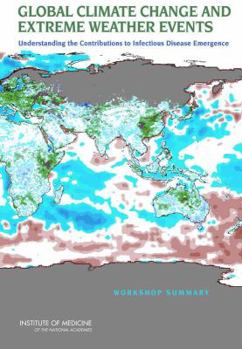Global Climate Change and Extreme Weather Events: Understanding the Contributions to Infectious Disease Emergence: Workshop Summary
Long before the germ theory of disease was described, late in the nineteenth century, humans knew that climatic conditions influence the appearance and spread of epidemic diseases. Ancient notions about the effects of weather and climate on disease remain embedded in our collective consciousness-through expressions such as cold for rhinovirus infections; malaria, derived from the Latin for bad air; and the common complaint of feeling under the weather. Today, evidence is mounting that earth's climate is changing at a faster rate than previously appreciated, leading researchers to view the longstanding relationships between climate and disease with new urgency and from a global perspective. On December 4 and 5, 2007, the Forum on Microbial Threats hosted a public workshop in Washington, DC to consider the possible infectious disease impacts of global climate change and extreme weather events on human, animal, and plant health, as well as their expected implications for global and national security.
Related Subjects
Medical Medical Books Science Science & Math Science & Scientists Science & Technology




